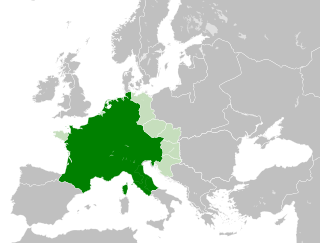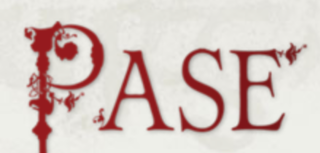Related Research Articles

Charlemagne or Charles the Great, a member of the Carolingian dynasty, was King of the Franks from 768, King of the Lombards from 774, and the Emperor of the Romans from 800. Charlemagne succeeded in uniting the majority of western and central Europe and was the first recognized emperor to rule from western Europe after the fall of the Western Roman Empire around three centuries earlier. The expanded Frankish state that Charlemagne founded was the Carolingian Empire, which is considered the first phase in the history of the Holy Roman Empire. He was canonized by Antipope Paschal III—an act later treated as invalid—and he is now regarded by some as beatified in the Catholic Church.

The Saxons were a group of Germanic peoples whose name was given in the early Middle Ages to a large country near the North Sea coast of northern Germania, in what is now Germany. In the late Roman Empire, the name was used to refer to Germanic coastal raiders, and in a similar sense to the later "Viking". Their origins are believed to be in or near the German North Sea coast where they appear later, in Carolingian times. In Merovingian times, continental Saxons had been associated with the activity and settlements on the coast of what later became Normandy. Their precise origins are uncertain, and they are sometimes described as fighting inland, coming into conflict with the Franks and Thuringians. There is possibly a single classical reference to a smaller homeland of an early Saxon tribe, but its interpretation is disputed. According to this proposal, the Saxons' earliest area of settlement is believed to have been Northern Albingia. This general area is close to the probable homeland of the Angles.

Æthelwulf was King of Wessex from 839 to 858. In 825, his father, King Ecgberht, defeated King Beornwulf of Mercia, ending a long Mercian dominance over Anglo-Saxon England south of the Humber. Ecgberht sent Æthelwulf with an army to Kent, where he expelled the Mercian sub-king and was himself appointed sub-king. After 830, Ecgberht maintained good relations with Mercia, and this was continued by Æthelwulf when he became king in 839, the first son to succeed his father as West Saxon king since 641.

Æthelbald was King of Wessex from 855 or 858 to 860. He was the second of five sons of King Æthelwulf. In 850, Æthelbald's elder brother Æthelstan defeated the Vikings in the first recorded sea battle in English history, but he is not recorded afterwards and probably died in the early 850s. The next year Æthelwulf and Æthelbald inflicted another defeat on the Vikings at the Battle of Aclea. In 855 Æthelwulf went on pilgrimage to Rome and appointed Æthelbald King of Wessex, while Æthelberht, the next oldest son, became King of Kent, which had been conquered by Wessex thirty years earlier.

Æthelstan or Athelstan was King of the Anglo-Saxons from 924 to 927 and King of the English from 927 to his death in 939. He was the son of King Edward the Elder and his first wife, Ecgwynn. Modern historians regard him as the first King of England and one of the "greatest Anglo-Saxon kings". He never married and had no children; he was succeeded by his half-brother, Edmund I.

The Carolingian Empire (800–888) was a large Frankish-dominated empire in western and central Europe during the Early Middle Ages. It was ruled by the Carolingian dynasty, which had ruled as kings of the Franks since 751 and as kings of the Lombards in Italy from 774. In 800, the Frankish king Charlemagne was crowned emperor in Rome by Pope Leo III in an effort to transfer the Roman Empire from the Byzantine Empire to western Europe. The Carolingian Empire is considered the first phase in the history of the Holy Roman Empire.
Medieval studies is the academic interdisciplinary study of the Middle Ages.
Eadburh, also spelled Eadburg, was the daughter of King Offa of Mercia and Queen Cynethryth. She was the wife of King Beorhtric of Wessex, and according to Asser's Life of Alfred the Great she killed her husband by poison while attempting to poison another. She fled to Francia, where she is said to have been offered the chance of marrying Charlemagne, but ruined the opportunity. Instead she was appointed as the abbess of a convent. Here she is said to have fornicated with an English exile. As a result, she was eventually expelled from the monastery and ended her days begging in the streets of Pavia.

Eadgifu or Edgifu also known as Edgiva or Ogive was Queen of the West Franks as the wife of King Charles the Simple. She was a daughter of Edward the Elder, King of Wessex and England, and his second wife Ælfflæd.
Ermengarde of Hesbaye, probably a member of the Robertian dynasty, was Carolingian empress from 813 and Queen of the Franks from 814 until her death as the wife of the Carolingian emperor Louis the Pious.

East Francia or the Kingdom of the East Franks was a successor state of Charlemagne's empire ruled by the Carolingian dynasty until 911. It was created through the Treaty of Verdun (843) which divided the former empire into three kingdoms.

The Prosopography of Anglo-Saxon England (PASE) is a database and associated website that aims to construct a prosopography of individuals within Anglo-Saxon England The PASE online database presents details of the lives of every recorded individual who lived in, or was closely connected with, Anglo-Saxon England from 597 to 1087, with specific citations to each primary source describing each factoid.
Eardwulf was king of Northumbria from 796 to 806, when he was deposed and went into exile. He may have had a second reign from 808 until perhaps 811 or 830. Northumbria in the last years of the eighth century was the scene of dynastic strife between several noble families: in 790, king Æthelred I attempted to have Eardwulf assassinated. Eardwulf's survival may have been viewed as a sign of divine favour. A group of nobles conspired to assassinate Æthelred in April 796 and he was succeeded by Osbald: Osbald's reign lasted only twenty-seven days before he was deposed and Eardwulf became king on 14 May 796.
Sarah Rosamund Irvine Foot is an English Anglican priest and early medieval historian, currently serving as Regius Professor of Ecclesiastical History at the University of Oxford. On 1 July 2023 she will become the first woman to serve as Dean of Christ Church, Oxford.
Barbara Yorke FRHistS FSA is a historian of Anglo-Saxon England, specialising in many subtopics, including 19th-century Anglo-Saxonism. She is currently emeritus professor of early Medieval history at the University of Winchester, and is a fellow of the Royal Historical Society. She is an honorary professor of the Institute of Archaeology at University College London.
Pauline Stafford is Professor Emerita of Early Medieval History at Liverpool University, and visiting professor at Leeds University in England. Dr Stafford is a former vice-president of the Royal Historical Society.
Henry Royston Loyn, FBA, was a British historian specialising in the history of Anglo-Saxon England. His eminence in his field made him a natural candidate to run the Sylloge of the Coins of the British Isles, which he chaired from 1979 to 1993. He was Professor of Medieval History in the University College of South Wales and Monmouthshire and afterwards Professor of Medieval History at Westfield College in the University of London.
Leslie Elizabeth Webster, is an English retired museum curator and art historian of Anglo-Saxon and Viking art. She worked from 1964 until 2007 at the British Museum, rising to Keeper, where she curated several major exhibitions, and published many works, on the Anglo-Saxons and Early Middle Ages.
Leo I was archbishop of Ravenna from A.D. 770, following a disputed election, until his death in A.D. 777. Archbishop Leo played an important role in the arrest of Paul Afiarta and was the subject of letters from Pope Hadrian I to Charlemagne collected in the Codex Carolinus and dated from late 774.
Stephen David Baxter is a British historian. He has been Barron Fellow and Tutor in Medieval History at St Peter's College, Oxford, since 2014, and in 2020 he was awarded the title of Professor of Medieval History by the University of Oxford. He specialises in lordship in late Anglo-Saxon and early Norman England, and the Domesday Book.
References
- ↑ Fouracre, Paul; Ganz, David, eds. (3 January 2020). "Introduction: Dame Jinty Nelson . . . An Appreciation". Frankland: The Franks and the world of the early middle ages. Manchester University Press. pp. 1–6. ISBN 978-1-5261-4825-4.
- ↑ "Birthdays", The Guardian , p. 43, 28 March 2014
- ↑ NELSON, Dame Janet Laughland, (Dame Jinty Nelson), Who's Who 2009, A & C Black, 2008; online edn, Oxford University Press, Dec 2008 Profile, ukwhoswho.com; accessed 3 September 2009.
- ↑ "Past Presidents of the EHS | Ecclesiastical History Society". history.ac.uk. Retrieved 4 March 2019.
- ↑ "Raleigh Lectures on History". The British Academy. text video
- 1 2 "Jinty Nelson Award for Inspirational Teaching & Supervision in History - RHS". RHS. Retrieved 23 January 2018.
- ↑ "Prosopography of Anglo-Saxon England: Team". pase.ac.uk. Retrieved 4 March 2019.
- ↑ King and Emperor. penguin.co.uk. Retrieved 4 March 2019.
- ↑ "Honorary Graduates of the University". 14 August 2017. Retrieved 4 March 2019.
- ↑ "Honorary degrees (21 June 2007)". University of St Andrews news. 22 June 2007. Retrieved 4 March 2019.
- ↑ "07-2009 Press Releases | News". Queen's University Belfast. Retrieved 4 March 2019.
- ↑ "University of York honours 11 for their contributions to society - News and events". The University of York. Retrieved 4 March 2019.
- ↑ "World leading scientists among 2010 honours - News". University of Liverpool. 16 July 2010. Retrieved 4 March 2019.
- ↑ "Graduation celebrations for the class of 2010". The University of Nottingham. Retrieved 4 March 2019.
- ↑ Nelson, Janet L. (2019). King and Emperor: A New Life of Charlemagne. University of California Press. ISBN 978-0520314207 – via Google Books.
- ↑ Harkins, Franklin T. (2019). "Review of Reading the Bible in the Middle Ages ed. by Jinty Nelson and Damien Kempf". The Catholic Historical Review. 105 (3): 573–575. doi:10.1353/cat.2019.0109. ISSN 1534-0708. S2CID 211649817.
- ↑ BBC Four – King Alfred and the Anglo Saxons. Accessed 21 August 2013.